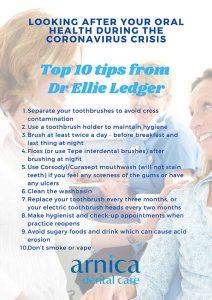As it could be some time before you get to see your dentist, it is vital that you do everything you can to keep your teeth and gums healthy.
As I write this, it is Wednesday April 1 2020, Day 8 of the Coronavirus lockdown. All dental practices other than special urgent care dental hubs are now closed to help minimise the spread of the virus, although many are still taking calls advising patients.
We can only speculate on when we are likely to reopen, therefore, it could be sometime before you next see your dentist.
With this in mind, I wanted to remind everyone how best to look after their teeth and gums. Having healthy teeth and gums will minimise the chances of developing issues that require treatment. We don’t want you to develop any issues that, left unchecked, might cause serious pain or effect your health and well-being.
1. Separate your toothbrushes to avoid cross contamination
2. Use a toothbrush holder to maintain hygiene
3. Brush at least twice a day – before breakfast and last thing at night
4. Floss (or use Tepe interdental brushes) after brushing at night
5. Use Corsodyl/Curasept mouthwash (will not stain teeth) if you feel any soreness of the gums or have any ulcers
6. Clean the washbasin
7. Replace your toothbrush every three months, or your electric toothbrush heads every two months
8. Make hygienist and check-up appointments when practice reopens
9. Avoid sugary foods and drink which can cause acid erosion
10. Don’t smoke or vape

Click image above or this link to download PDF
Here are the above points in more detail.
Using a toothbrush holder is a little like you and the rest of your family all huddling together, which normally would be applauded. However, during the coronavirus pandemic it’s advisable to follow some of the social distancing guidelines with your toothbrushes to limit or even slow-up family cross infection.
If it’s not kept in a toothbrush holder, then it needs to be stored hygienically elsewhere, and the best place is in your own toothbrush case. Using a toothbrush case is best practice for staying away from home and/or travelling.
It’s easy to forget normal routines when everything else has changed – but don’t forget to brush your teeth twice a day. Use a fluoride toothpaste, or perhaps try a sensitive formula toothpaste if your teeth feel sensitive to cold. Brush your teeth as guided by your dentist or hygienist. In most cases, you’ll be advised to brush your teeth before breakfast and last thing at night.
I recommend flossing after your last brush of the day, just before bedtime.
If you’re happy using traditional floss, make sure you follow your dentist’s or hygienist’s instructions.
Based on feedback from patients, and seeing the results for myself, I recommend using TePe’s – which are small interdental brushes – instead of floss, as they are far easier to use.
I recommend mouthwashing with a chlorheidine based mouthwash for gums that might be a little sore or irritated or, if you have any gum bleeding.
Your choice of mouthwash is important as some can damage the enamel on your teeth. If you haven’t been advised by your dentist or hygienist on which mouthwash to use (or if you have but can’t remember!), then in most cases we recommend using Corsodyl/Curasept.
I’ve lost count how many times I have to remind the children to clean the washbasin after they have brushed their teeth. It is now more important than ever, as we try to minimise cross-contamination.
After each brush, refill the sink with hot soapy water, clean it thoroughly then rinse and drain.
To be effective, the bristles on your toothbrush should be firm and upright. As soon as bristles become worn and crooked they are less capable of cleaning the surfaces of your teeth and the spaces in between.
The same is true, if not more so, for electric toothbrushes. To be effective the rotational motion of the toothbrush requires firm yet soft, upright bristles. As the rotational motion for electric toothbrushes is much faster than cleaning by hand, bristles on electric toothbrush heads tend to wear out faster. In that case, I recommend changing them every two months. Or sooner, if noticeably worn.
Currently, we are unable to know when we’ll return to normal operating status, so it is likely you will have missed your ‘recall’ or general check-up appointment and your hygienist appointment.
We recommend that you book in for your next general check-up and/or hygienist appointment as soon as your practice returns to normal operating status.
Plaque is a soft sticky film on your teeth which converts sugar into acid. The acid then destroys enamel, and can cause inflammation and infection along your gumline.
To help minimise this, try to cut down your consumption and frequency of sugary foods. If you can, try to avoid too much of things like sweets, cakes, biscuits, fizzy drinks and fruit juices.
And, do try to avoid them all together before bedtime. We produce less saliva at night which would normally buffer the acid attack on your teeth and gums.
If you smoke or vape, now is the time to try and give up. There are a lot of health reasons to do so, not least as it is a big factor in causing gum disease, with its associated pain and inflammation. But, also as Covid 19 is a respiratory virus – therefore, the healthier your lungs are, the better your likelihood of a speedy recovery.
Stay safe, stay well.

Dr Eleanor Ledger BDS (Wales) FDSRCS (England) Principal Dentist Arnica Dental Care Cheltenham
© 2026 Arnica Dental Care and Bupa Dental Care are trading names of Oasis Dental Care Limited. Registered in England & Wales No: 478127. Registered office: Bupa Dental Care, Vantage Office Park, Old Gloucester Road, Hambrook, Bristol, United Kingdom, BS16 1GW.